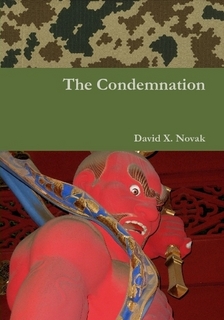Note on The Condemnation

The Condemnation is one of three works by my pen of which I am most proud. Something of its genesis is recorded in the introduction I wrote for War for Peace, its immediate predecessor in my stupendous output that year—stupendous referring to quantity and not quality, it goes without saying (of which I can hardly judge).
The book consists of 100 villanelles. To my mind, the only previous villanelle in English which could be called unequivocally successful belonged to Dylan Thomas, and certain strains of emulation will be obvious. Since then I have learned that—contemporary to Thomas—other villanelles were written, but at the time it felt like I was upon a groundbreaking task (one which I subsequently repeated in two further books of 100: The Arraignment and The Recusal). The form has come into its own, with lots of writers now trying their hand at it and anthologies in English appearing; yet I believe these iterations bear my unique stamp.
Every day, more and more events in the realm of international politics occur which trace their beginnings to the invasion of March 19, 2003. This book was done just days before that, at a time when, although no bombs had fallen, the war was all but a fait accompli. It was a war of choice and—more than that—a war of popular choice. It is hard to understand the madness which overcame my countrymen, except that we see evidence of the continued malady around us every day.
W.H. Auden famously declared that poetry makes nothing happen—the phrase is “trotted out” to quote Don Share. The point is moot, but these poems were written with clear understanding that the poet had been precluded any immediate impact.
The book consists of 100 villanelles. To my mind, the only previous villanelle in English which could be called unequivocally successful belonged to Dylan Thomas, and certain strains of emulation will be obvious. Since then I have learned that—contemporary to Thomas—other villanelles were written, but at the time it felt like I was upon a groundbreaking task (one which I subsequently repeated in two further books of 100: The Arraignment and The Recusal). The form has come into its own, with lots of writers now trying their hand at it and anthologies in English appearing; yet I believe these iterations bear my unique stamp.
Every day, more and more events in the realm of international politics occur which trace their beginnings to the invasion of March 19, 2003. This book was done just days before that, at a time when, although no bombs had fallen, the war was all but a fait accompli. It was a war of choice and—more than that—a war of popular choice. It is hard to understand the madness which overcame my countrymen, except that we see evidence of the continued malady around us every day.
W.H. Auden famously declared that poetry makes nothing happen—the phrase is “trotted out” to quote Don Share. The point is moot, but these poems were written with clear understanding that the poet had been precluded any immediate impact.